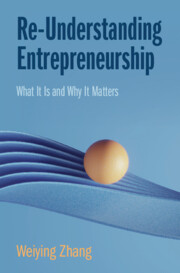Book contents
- Re-Understanding Entrepreneurship
- Re-Understanding Entrepreneurship
- Copyright page
- Contents
- Figures
- Preface
- Part I The Nature of Knowledge and Entrepreneurship
- Part II Entrepreneurs in Market Theories
- Part III Uncertainty of Innovation and Industrial Policy
- 9 Entrepreneurs in Economic Growth: Arbitrage and Innovation
- 10 The Uncertainty of Innovation
- 11 The Airship and Airplane Duel
- 12 Entrepreneurship and Industrial Policy
- Part IV Institutional Ecology of Entrepreneurship
- Book part
- References
- Index
12 - Entrepreneurship and Industrial Policy
from Part III - Uncertainty of Innovation and Industrial Policy
Published online by Cambridge University Press: 02 May 2024
- Re-Understanding Entrepreneurship
- Re-Understanding Entrepreneurship
- Copyright page
- Contents
- Figures
- Preface
- Part I The Nature of Knowledge and Entrepreneurship
- Part II Entrepreneurs in Market Theories
- Part III Uncertainty of Innovation and Industrial Policy
- 9 Entrepreneurs in Economic Growth: Arbitrage and Innovation
- 10 The Uncertainty of Innovation
- 11 The Airship and Airplane Duel
- 12 Entrepreneurship and Industrial Policy
- Part IV Institutional Ecology of Entrepreneurship
- Book part
- References
- Index
Summary
This chapter first argues that the disagreement between advocates and opponents of industrial policy is actually a disagreement between the two different market theory paradigms. One is the “neoclassical economics paradigm” and the other is the “Mises–Hayek paradigm.” The chapter then analyzes the challenges faced by industrial policy from the perspectives of both cognitive limitation and incentive distortion. The basic conclusion is that industrial policy is destined to fail. Ignorance of entrepreneurship is the fatal weakness of industrial policy advocates. The two primary justifications for industrial policy are “externalities” and the “coordination failure” of the market. With a correct understanding of entrepreneurship, however, these two justifications are untenable. The chapter also argues that the “comparative advantage strategy” of a nation is endogenously created by entrepreneurs, not determined by so-called “endowments.”
- Type
- Chapter
- Information
- Re-Understanding EntrepreneurshipWhat It Is and Why It Matters, pp. 219 - 240Publisher: Cambridge University PressPrint publication year: 2024

